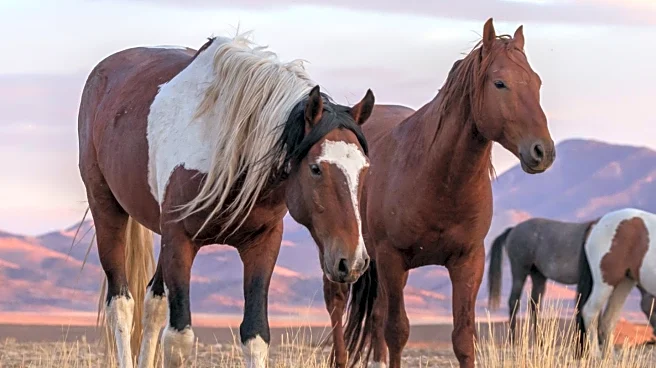What's Happening?
Jumper, a wild horse renowned for his ability to jump fences, has passed away in North Carolina's Outer Banks. Known affectionately as JW, Jumper lived into his 30s, a notably long lifespan for a horse.
His unique skill of jumping fences at a local park made him a beloved figure among the community and other wild horses. Meg Puckett, director of herd management at the Corolla Wild Horse Fund, shared her memories of Jumper, highlighting his independent spirit and the impact he had on younger stallions. Jumper was a bachelor throughout his life, often seen interacting with both older and younger stallions, teaching them manners and how to behave as grown-up stallions.
Why It's Important?
Jumper's passing is significant as it marks the loss of a unique and beloved member of the wild horse community in North Carolina. His ability to jump fences and his interactions with other horses contributed to the cultural heritage of the area. The Corolla Wild Horse Fund, which works to protect and care for the wild horses, sees Jumper's legacy as a reminder of the resilience and beauty of nature. His life and actions have left a lasting impression on the community and the younger horses he interacted with, ensuring that his spirit lives on through them.
What's Next?
The Corolla Wild Horse Fund will continue its efforts to protect and manage the wild horse population in the Outer Banks. Jumper's legacy will likely inspire ongoing conservation efforts and community engagement to preserve the unique characteristics of these wild horses. The organization may also focus on educating the public about the importance of these horses to the local ecosystem and cultural heritage.
Beyond the Headlines
Jumper's story highlights the broader ethical and cultural dimensions of wildlife conservation. His life serves as a testament to the importance of preserving natural habitats and the creatures that inhabit them. The story of Jumper also underscores the emotional connections humans can form with wildlife, emphasizing the need for compassionate conservation practices.










